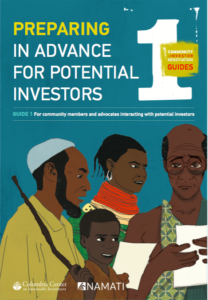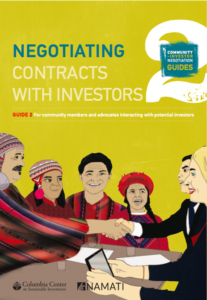Useful Resources
CCSI and Namati, Community-Investor Negotiation Guide 1: Preparing in Advance for Potential Investors
This guide sets out practical guidance to help communities and their advisors to prepare before potential investors arrive, and after an investor has approached a community. It covers topics and activities such as visioning a community’s desired future, understanding how valuable the land is for the community, and ensuring the inclusion of all voices within community decision-making, as well as pointers on meaningful consultation, information access, and knowing the community’s rights. The guide is designed to apply to agriculture and forestry projects but may have some applicability to agreements reached in the contexts of extractive or renewable energy projects, among others.
CCSI and Namati, Community-Investor Negotiation Guide 2: Negotiating Contracts with Investors
This guide for communities and their advisors provides practical guidance on the issues to consider when a community has decided to negotiate a contract with an investor. Using example clauses, and guidance boxes for community discussion and seeking legal advice, it describes all of the various sections and clauses that should be in a contract, advises what protective language to try to include in the contract to make it enforceable, and warns against types of problematic contractual language that should be avoided. The guide is designed to apply to agriculture and forestry projects but may have some applicability to agreements reached in the contexts of extractive or renewable energy projects, among others.
IIED, SDSG and CCSI, Requirements for community development in mining laws
This resource includes “requirements for community development” in domestic laws relating to mining. Such laws include requirements for companies to contribute to the development of, or provide socio-economic benefits to, community members located on or near the concession area. These contributions may include revenue sharing or other monetary compensation, improvements to educational or health services, opportunities for training or other livelihood diversification, and construction or repair of infrastructure, among others. All legislation can be searched in a map and is available for download.
CCSI, Directory of Community Guidance on Agreements relating to Agriculture or Forestry Investments (2018)
While there are a number of existing resources that can assist communities and their advocates in their interactions with investors over land—from negotiating better agreements with investors, to monitoring whether investors fulfill the terms of their agreements—these resources are not always easy to find. This detailed directory lists relevant guides and other documents, provides links to the original documents, and includes brief descriptions of their content.

